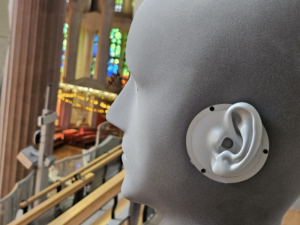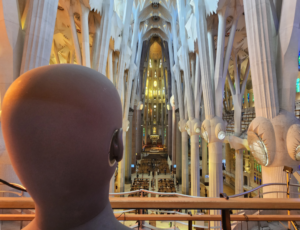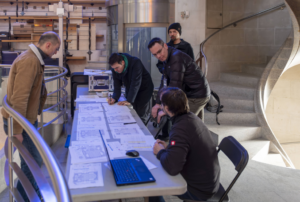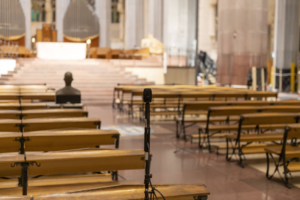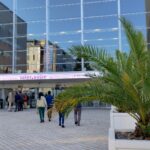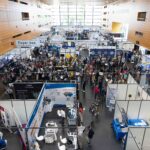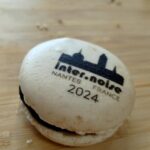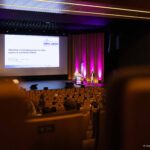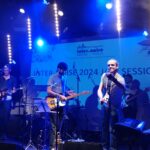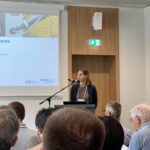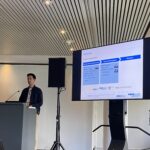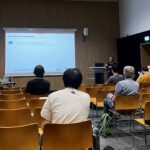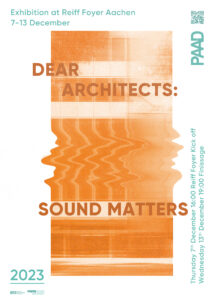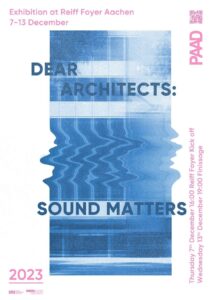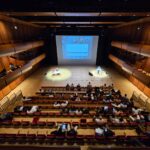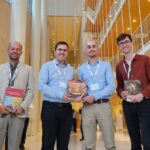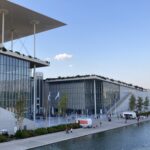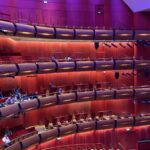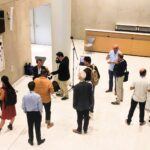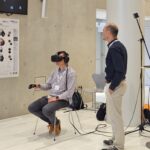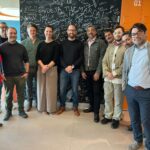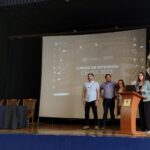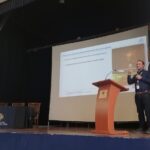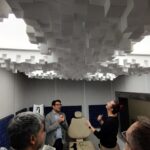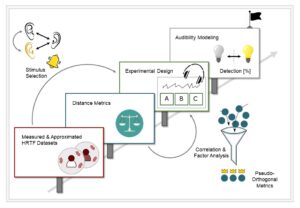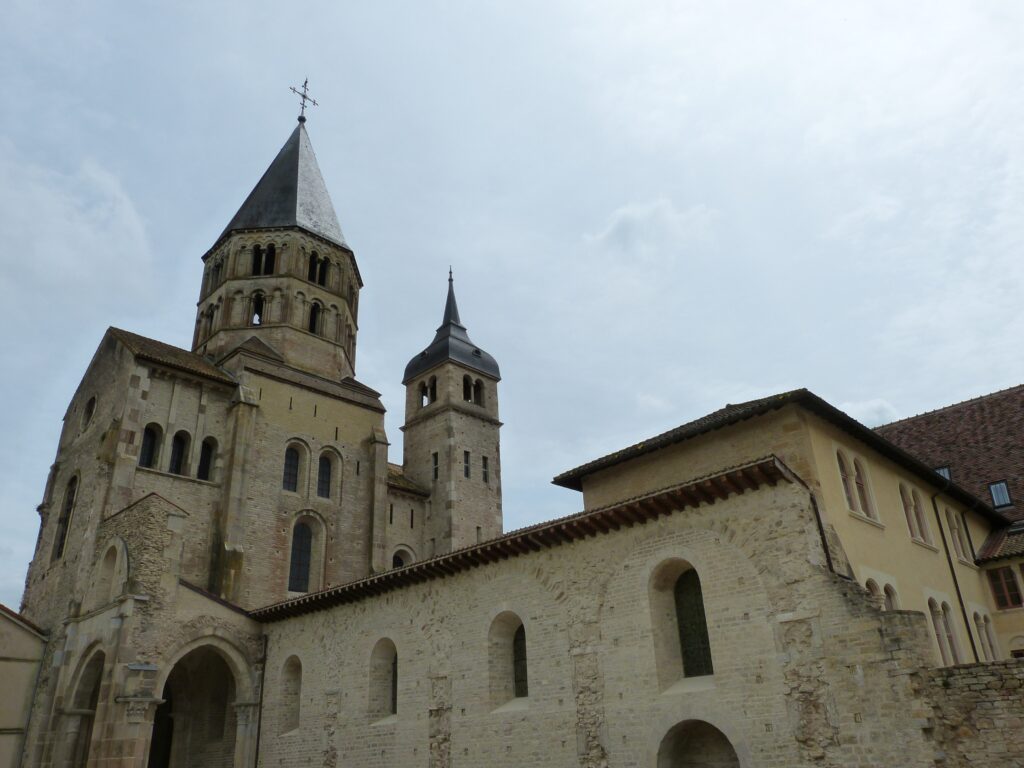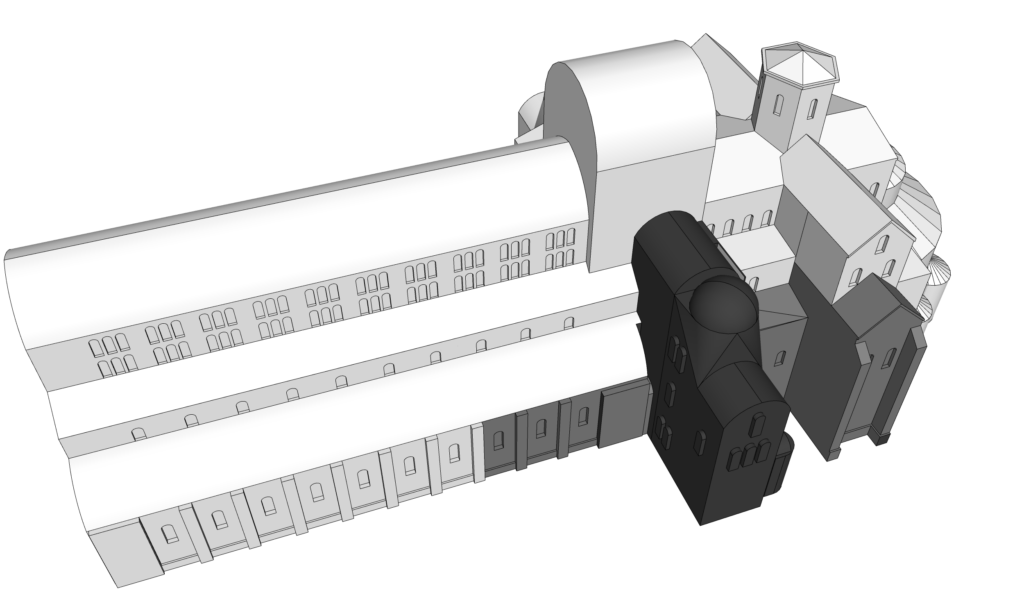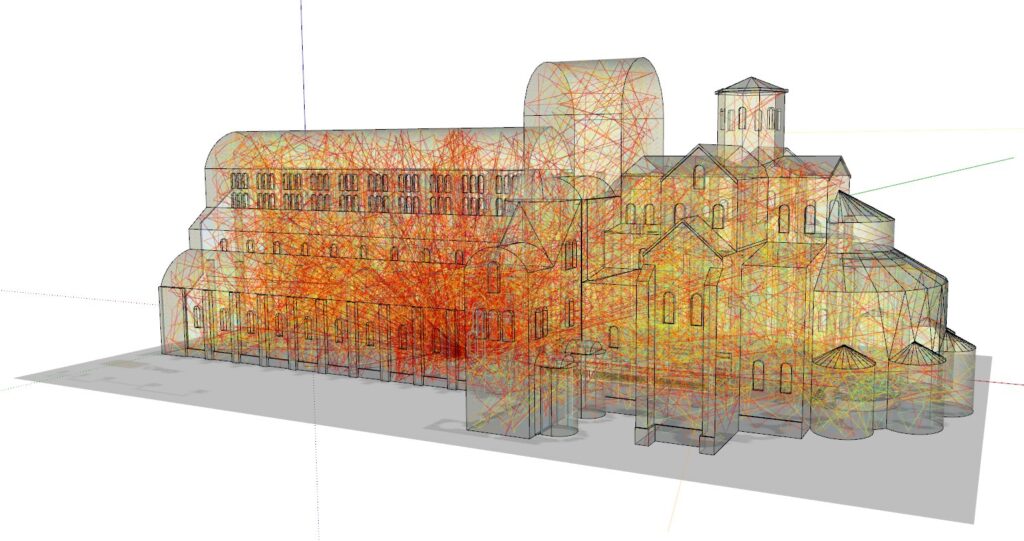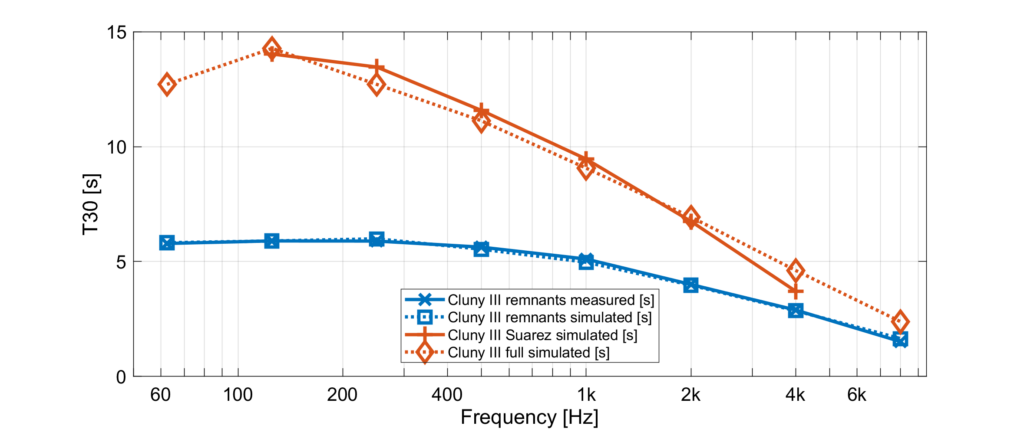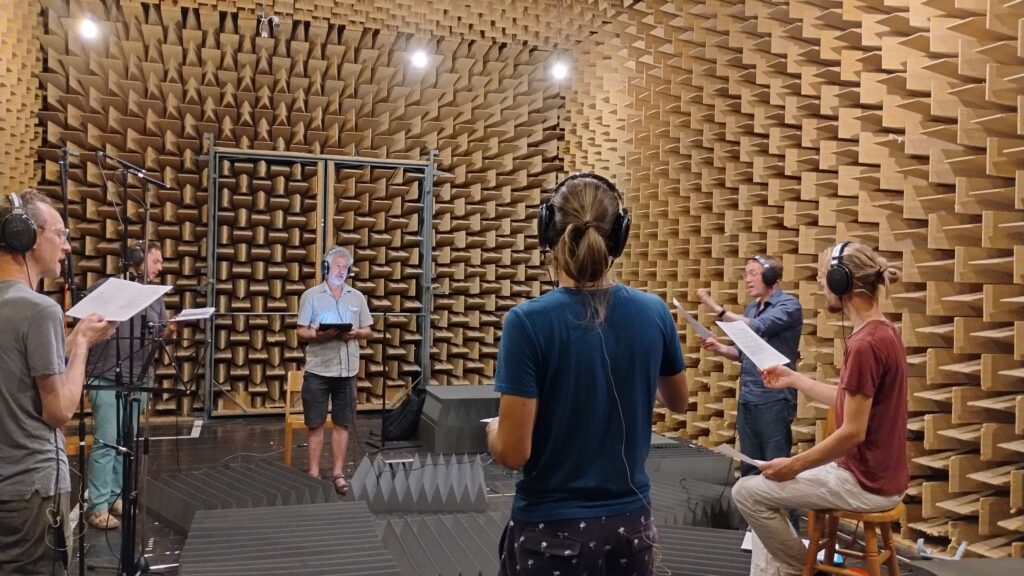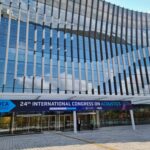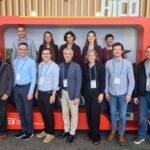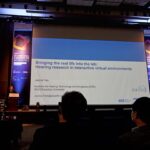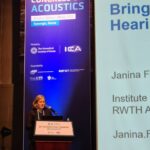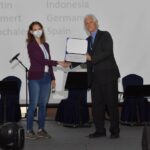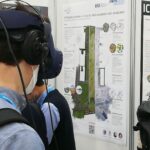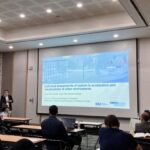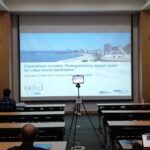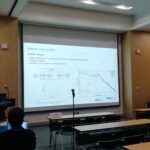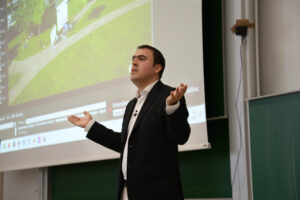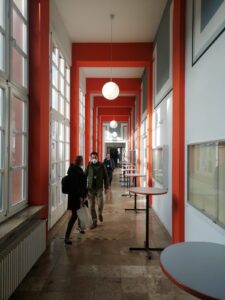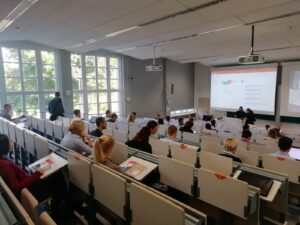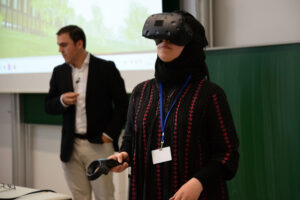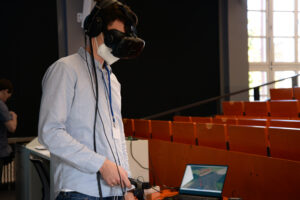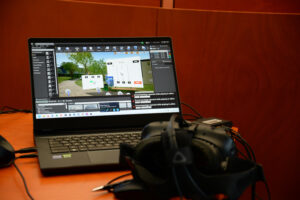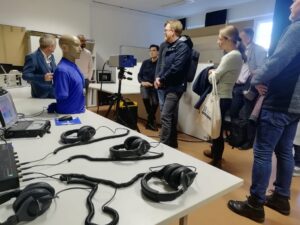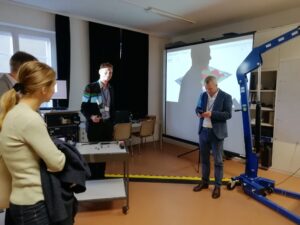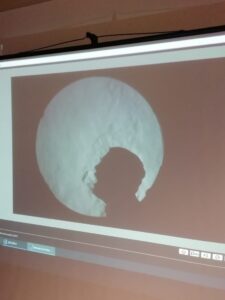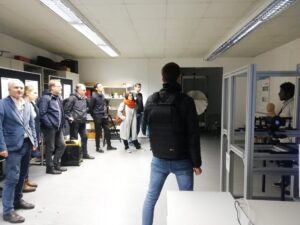Kategorie: ‘Research’
IHTA Contributions to DAS|DAGA 2025
This year’s DAS|DAGA 2025 is the joint annual meeting of the Danish and German Acoustical Societies (DAS and DEGA). The conference takes place in Copenhagen from 17th to 20th of March, 2025. As usual, IHTA members will present their work on the plethora of research topics covered at IHTA. This year, the IHTA is involved in a total of 23 contributions. In addition, the IHTA has been very active in organizing special sessions and events (see below).
We are happy to invite you to our presentations and posters!
You can find the full conference program in the DAS|DAGA Web-App. Every contribution in the table below links to its entry in the web-app, where you can read its abstract and add it to your personal conference schedule.
We are looking forward to meet you there!
| Monday, March 17 | ||||
| Simon Kersten, Michael Vorländer | Physical Mechanisms Underlying the Occlusion Effect | Precolloquium: Hearing Acoustics: Models, algorithms and applications | 12:25 | Room 20 |
| Tuesday, March 18 | ||||
| Rouben Rehman, Simon Kersten, Janina Fels | An Experimental Setup for the Estimation and Emulation of Bone and Air Conducted Components of One’s Own Voice | Methods for Technical and Perceptual Evaluations of Hearing Devices 1 | 14:20 | Room 19 |
| Kristin Ohlmann, Simon Kersten, Michael Vorländer, Birger Kollmeier | Perceptual Estimation of the Bone Conduction Path for One’s Own Voice | Psychoacoustics (Poster) | 15:20 | Hall E, Poster Island H |
| Cornelius Frankenbach, Carsten Herzog, Julia Seitz, Janina Fels | Comparing Localization Accuracy With Generic, Estimated, and Individual HRTFs Using Dynamic Binaural Synthesis | Binaural Technologies | 16:40 | Room 5 |
| Julia Seitz, Janina Fels | A Questionnaire Suitable to Assess Listening Effort in Children and Adults | Noise Effects in Children | 17:40 | Hall B - Sydhavn (B4M4) |
| Wednesday, March 19 | ||||
| Nils Rummler, Gülnihan Atay, Josep Llorca-Bofí, Michael Vorländer | RAVEN Benchmark Using the Loudspeaker Orchestra | Virtual Acoustics 2 | 8:40 | Room 5 |
| Lara Stürenburg, Lukas Aspöck, Janina Fels | Investigating the Perception of a Heat Pump in Different Audio-Visual Settings | Effects of Noise & Noise Policy | 10:00 | Hall B - Sydhavn (B4M4) |
| André Kruh-Elendt, Christian Laufs, Jonas Heck, Janina Fels, Moritz Lippold, Christoph Klanten, Andreas Herweg | Evaluation of Stress in Response to Traffic Noise Using Virtual Reality | Effects of Noise & Noise Policy | 10:20 | Hall B - Sydhavn (B4M4) |
| Thomas Deutsch, Luigi Falanga, Iring Koch, Janina Fels | Spatial Release From Masking With and Without Simulated Hearing Loss: Comparison of Different Spatial Audio Reproduction Methods | Audiological and Medical Acoustics | 11:00 | Room 19 |
| João Fatela, Anne Heimes, Michael Vorländer | Efficient Acoustic Radiosity Modelling for Precise Bi-directional Reflectance Distribution Patterns | Virtual Acoustics 2 | 11:20 | Room 5 |
| Marco Berzborn, Michael Vorländer | Stochastic Inference of Directional Decay Times in a Reverberation Room | Room Acoustics 2 | 15:00 | Aud 15 |
| Lukas Aspöck, Chalotorn Möhlmann, Philipp Schäfer, Hanna Potulski, Vanessa Overhage, Thomas Gries, Christa Reicher, Janina Fels | Acoustic Simulation and Auralizations to Investigate the Impact of Textile Building Façades in Urban Environments | Effects of Noise & Noise Policy (Poster) | 15:20 | Hall E, Poster Island D |
| Gülnihan Atay, Josep Llorca-Bofí, Michael Vorländer | Audio-Visual Perception of Loudness in Concert Halls | Room Acoustics (Poster) | 15:20 | Hall E, Poster Island B |
| Manan Lamba, Simon Kersten, Stephan D. Ewert, Michael Vorländer, Birger Kollmeier | Perceived Level Differences at Equal Loudness in Headphone-Based Comparisons of Virtual Room Acoustics and Diotic Stimuli | Room Acoustics (Poster) | 15:20 | Hall E, Poster Island B |
| Alexander Raake, Stephan Fremerey, Carolin Breuer, Larissa Leist, Maria Klatte, Janina Fels | Evaluation of Audiovisual Scene Analysis in Virtual Reality Classroom Scenarios | AUDICTIVE 1 - Auditory Cognition in Interactive Virtual Environments | 16:20 | Room 6+7 |
| Carolin Breuer, Larissa Leist, Stephan Fremerey, Alexander Raake, Maria Klatte, Janina Fels | Exploring the Impact of Room Acoustics on Auditory Selective Attention | AUDICTIVE 1 - Auditory Cognition in Interactive Virtual Environments | 17:40 | Room 6+7 |
| Thursday, March 20 | ||||
| Cosima A. Ermert, Jonathan Ehret, Chinthusa Mohanathasan, Andrea Bönsch, Torsten W. Kuhlen, Sabine J. Schlittmeier, Janina Fels | Influence of (Non) Intelligible Background Speech on Memory and Listening Effort in Conversational Situations | AUDICTIVE 2 - Auditory Cognition in Interactive Virtual Environments | 8:40 | Room 6+7 |
| Lukas J. Vollmer, Leonie Schmitz, Karin Loh, Janina Fels | Cue-Related Evoked Potentials Capture Auditory Attention Switches | AUDICTIVE 2 - Auditory Cognition in Interactive Virtual Environments | 9:20 | Room 6+7 |
| Pascal Palenda, Christoph Kirsch, Stephan D. Ewert, Michael Vorländer | Validation of a Simplified Higher-Order Diffraction Model in Urban Environments | Outdoor Sound Propagation 1 | 9:20 | Hall B - Nørrebro (B3M1) |
| Christoph Kirsch, Pascal Palenda, Michael Vorländer, Stephan D. Ewert | A Toolbox for Filter-Based First- and Higher-Order Edge Diffraction Modeling | Outdoor Sound Propagation 1 | 9:40 | Hall B - Nørrebro (B3M1) |
| Moritz Bender, Jamilla Balint, Janina Fels | A Study on Voice Quality and Vocal Fatigue of Lecturers in Lecture Halls | Speech Processing 1 | 10:40 | Room 19 |
| Anne Heimes, Densil Cabrera, Michael Vorländer | Determination of Bidirectional Scattering Coefficients From Measured Scattering Patterns | Outdoor Sound Propagation 2 | 14:00 | Hall B - Nørrebro (B3M1) |
| Chalotorn Möhlmann, Lukas Aspöck, Janina Fels | Auralization of Vehicle Pass-By Using Impulse Responses of Dynamic Urban Environments | Outdoor Sound Propagation 2 | 15:20 | Hall B - Nørrebro (B3M1) |
| Jonas Heck, Josep Llorca-Bofí, Michael Vorländer, Janina Fels | Efficient Modeling of Urban Traffic Scenarios for Virtual Reality | Virtual Acoustics 3 | 15:40 | Room 5 |
| Organized Sessions | ||||
| Noise Effects in Children | Julia Seitz, Kerstin Persson Waye | Tuesday, 18.03.2025 | 16:00 - 18:20 | Hall B - Sydhavn (B4M4) |
| AUDICTIVE 1 - Auditory Cognition in Interactive Virtual Environments | Janina Fels, Carolin Breuer | Wednesday, 19.03.2025 | 16:00 - 18:00 | Room 6+7 |
| AUDICTIVE 2 - Auditory Cognition in Interactive Virtual Environments | Thursday, 20.03.2025 | 08:40 - 11:00 | ||
| Junge DEGA Events | ||||
| Icebreaker | junge DEGA Jonas Heck, Tabea Breitkreutz, Lara Stürenburg | Monday, 17.03.2025 | 15:00 - 16:00 | Balcony 1, in front of Auditorium 10-12 (Plenary hall) |
| Pub night | Monday, 17.03.2025 | 20:00 - 23:00 | The Moose (Sværtegade 5, 1118 København K) | |
| Speed Dating — Meet the Acousticians | Tuesday, 18.03.2025 | 17:40 - 18:20 | Hall B - Nordhavn (B3M10) | |
| Research in short(s) & Power-Point-Karaoke | Wednesday, 19.03.2025 | 16:00 - 17:20 | Room 20 | |
| Mentoring-Café | Wednesday, 19.03.2025 | 17:20 - 18:00 | Room 18 | |
| Other Events | ||||
| Frauen@DEGA Meeting | Karin Loh, Cleopatra Christina Moshona | Thursday, 20.03.2025 | 12:30 - 14:00 | Room 5 |
| Hands-On Workshop: PYFAR - Python Packages for Acoustics Research | IHTA (RWTH Aachen University), Audio Communication Group (TU Berlin), Department of Engineering Acoustics (TU Berlin), Institute of Communications Engineering (TH Köln) | Thursday, 20.03.2025 | 12:30 - 14:00 | Room 6+7 |
Virtual Acoustics: Release Version 2024a
The newest version of our auralization framework Virtual Acoustics (VA) was just released. The new version comes with a reworked python interface (VAPython) which is more user-friendly and now has *NatNetTracking* support. Also, there are some minor improvements in the audio rendering process.
The current as well as all former releases are now hosted on Zenodo, which allows citing a specific VA version without any ambigouity.
Further information on VA can be found on the project’s website. This includes a detailed changelog.

Aachen Acoustics Colloquium 2024
Currently the 15th Aachen Acoustics Colloquium is taking place at Parkhotel Quellenhof in Aachen. This year’s scientific program includes 26 interesting contributions (2 Keynotes, 18 presentations and 6 poster presentations) about current research within the area of automotive acoustics, accompanied by a technical exhibition from various companies and research institutes. A detailed overview of the program can be found in this PDF.
Our institute is part of the organizing team of this event, which is attended by around 190 persons (~170 in-person and 22 online). On Tuesday morning, Michael Vorländer chaired the session „Infotainment in the vehicle“ including a very interesting keynote presentation by Hermann Ney on the current progress in speech and language technology. In the following session about numerical methods and simulations, our research assistant Christian Dreier held a presentation titled „Speed-dependent directivity patterns of road traffic sound sources“.
Additionally at the exhibition, our Institute presented current progress of research projects, e.g., the BalSaM project, in form of interactive demonstrations.
- Hosting team of the AAC: Lutz Eckstein (ika), Klaus Genuit (HEAD acoustics), Michael Vorländer (IHTA) and Stefan Pischinger (fev). Photo: Stefan Hense.
- Christian Dreier during his presentation. Photo: Stefan Hense.
Paper published: Listening effort in children and adults in classroom noise
We are happy to share the publication of our journal paper „Listening effort in children and adults in classroom noise“ in Scientific Reports as part of the Auditory processing and perception collection!
Julia Seitz, Karin Loh, and Janina Fels conducted a study to investigate listening effort in children aged 6-10 years and young adults using a child-appropriate dual-task paradigm. Realistic classroom scenarios with multi-talker babble noise at different signal-to-noise ratios in anechoic and simulated classroom environments were investigated.
The key findings
• Found differences in listening effort between noise conditions in 8-10-year-olds
• Demonstrated the importance of considering room effects in listening experiments
• Observed correlations between subjective and behavioral measures of listening effort
This research contributes to our understanding of how children process speech in noisy classroom environments and could help to improve learning conditions.
Acoustic investigations at Sagrada Familia
At the end of February this year, a team of the Institute for Hearing Technology and Acoustics conducted acoustic measurements at the renown Basílica de la Sagrada Família in Barcelona. The team of experienced acousticians consisted of current and former employees of IHTA and was led by Josep Llorca-Bofí and Michael Vorländer.
In the further course of the project, the measurement data was evaluated, processed and auralizations were generated. The study revealed Gaudi’s design challenges and opportunities and is a basis for future musical instruments design in different places and its liturgical use of the Sagrada Família Foundation.
- IHTA’s dummy head in the Basilica. Photo: Josep Llorca-Bofi.
- IHTA’s dummy head in the Basilica. Photo: Josep Llorca-Bofi.
- IHTA’s team coordinating the acoustic measurements. Photo: Gottfried Behler.
- IHTA’s dodecahedron measurement speaker was used in Basicila Familia to determine room impulse responses. Photo: Gottfried Behler.
- Microphones used in the central seating area of the Basilica. Photo: Gottfried Behler.
- IHTA’s team at the basilica. Photo: Gottfried Behler.
Ehrenamtliches Engagement in Fachgesellschaften und Vereinen
Die ehrenamtliche Mitarbeit in Fachgesellschaften und Vereinen im Kontext des wissenschaftlichen Feldes der Akustik ist für die Koordination, den Austausch, die Ausrichtung und die Wahrnehmung des Fachbereichs auch in der Öffentlichkeit von großer Bedeutung.
Auch die wissenschaftlichen Mitarbeiter*innen am IHTA sind bereits in verschiedenen Rollen in Vereinen aktiv. Im August 2024 wurde Lara Stürenburg zum zweiten Mal in den Vorstandsrat der Deutschen Physikalischen Gesellschaft e.V. (DPG) im Bereich Hochschule gewählt. Herzlichen Glückwunsch zu dieser Wahl!
Die DPG ist die größte physikalische Fachgesellschaft der Welt und engagiert sich zu physikalischen Themen, vor allem fördert sie einen Informationsaustausch durch die Organisation von Fachtagungen. Auch die Nachwuchsförderung wird insbesondere durch den Arbeitskreis junge DPG unterstützt, in dem Lara zwischen 2018 und 2020 die Öffentlichkeitsarbeit übernommen hat.
Sowohl Prof. Janina Fels als auch Prof. Michael Vorländer haben bisher ebenfalls zahlreiche Ämter in Vereinen und Gesellschaften mit Akustikbezug wahrgenommen, beispielsweise auch im Vorstand der Gesellschaft der Deutschen Gesellschaft für Akustik e.V. (DEGA), in der derzeit auch IHTAs ehemaliger akademischer Direktor Gottfried Behler Mitglied des Vorstandes ist. Aktuell hat Michael Vorländer die Rolle des Präsidenten der amerikanischen Akustikgesellschaft (ASA) inne während Janina Fels seit 2020 als Fachkollegiatin in der Deutschen Forschungsgemeinschaft (Fach Akustik – Fachkollegium Mechanik und Konstruktiver Maschinenbau) gewählt ist (Wiederwahl in 2023) und darüber hinaus auch als zweite Vorsitzende des technischen Komitees „Psychological and Physiological Acoustics“ in der europäischen Akustikgesellschaft (EAA) aktiv ist.
In der Fachgruppe „junge DEGA“ wurde zudem unser wissenschaftlicher Mitarbeiter Jonas Heck bei der DAGA 2024 in Hannover als Fachgruppenleitung gewählt. Gemeinsam mit der Stellvertreterin Tabea Breitkreutz von der Hochschule Mittweida koordiniert er die Aktivitäten der Fachgruppe, unter anderem die Durchführung des bevorstehenden Herbstworkshops in Leipzig und Mittweida (eine Anmeldung ist hier noch bis zum 1. Oktober 2024 möglich).
Inter-Noise 2024 in Nantes
This year’s Inter-noise conference took place from August 25th to 29th in Nantes, France. More than 1500 delegates participated in this conference and presented interesting research in the field of acoustics and noise. Highlights of the conference included a plenary talk by Arnaud Can and Pierre Aumond (Joint Research Unit in Environmental Acoustics at Gustave Eiffel University, Nantes, France) on advanced characterization of urban sound environments and a keynote lecture about the child perspective on noise exposure and health effects, held by Kerstin Persson Waye from Gothenburg University, Sweden, who is also collaborating with IHTA in the Equal-Life project.
Members of IHTA travelled to the conference and presented the following research papers:
- Chalotorn Möhlmann: Validation measurement of vehicle pass-by models for dynamic urban environments (results of the BaLSaM project)
- Marco Berzborn: Inference of the acoustic properties of transversely isotropic porous materials
- Lara Stürenburg: Loudness and preference judgments for noises of a heat pump (results of the LowNoise project)
- Joao Fatela (Guest researcher from the University of Campania Luigi Vanvitelli, Naples, Italy):
An experimental setup to investigate relevant validation parameters for the auralization of commercial aircraft flyovers in complex urban contexts
Directly after the closing ceremony of the conference, the satellite workshop “Unlocking the Potential of Open Research Software in Acoustics at Inter-Noise 2024” started. This event was organized by Maarten Hornikx and Huiqing Wang, from the Building Acoustics team of Eindhoven University of Technology, and included interesting exchanges and presentation on the development, maintenance, documentation and distrubtion of acoustics-related open-source software. As one of four invited speakers, Lukas Aspöck held a presentation about IHTA’s auralization software Virtual Acoustics. The slides of this presentation are available for download (CC BY-SA 4.0).
Next to insightful overview presentations by Maarten Hornikx and Huiqing Wang, further successful research software was presented: Pyroomacoustics by Eric Bezzam, NoiseModelling by Pierre Aumond and SoundScapy by Andrew Mitchell, along with many examples of challanges and best practices for open research and open-source software development. Many thanks to Maarten and his team for the invitation and the organization of this exciting event.
- Entrance of the InterNoise venue. Photo: Lukas Aspöck
- Exhibition area at Internoise. Photo: Simon Bianchetti.
- Internoise 2024 Macarons. Photo: Lukas Aspöck
- Kerstin Persson Waye at her keynote presentation. Photo: Simon Bianchetti.
- Jam Session @ InterNoise. Photo: Lukas Aspöck
- Lara during her presentation. Photo: Lara Stürenburg.
- Chalotorn during his presentation. Photo: Carolin Schliephake.
- Lukas during the research software workshop. Photo: Enkela Alimadhi
Einladung zum Halbzeittreffen des BaLSaM-Projekts am 21.5.
Das Konsortium des Projekts “Braunkohlereviere als attraktive Lebensräume durch Straßengeräuschsimulation auf Basis bestehender Verkehrsdaten zur Minimierung von Lärm”(BaLSaM) lädt zum öffentlichen Halbzeittreffen ein. Es wird am 21.5.2024 von 8:30-13:00 Uhr im Institut für Kraftfahrzeuge der RWTH Aachen University stattfinden (Adresse: Steinbachstraße 7, 52074 Aachen, Deutschland).
Während des Treffens werden die Projektpartner den bisherigen Fortschritt des Projekts zu präsentieren. Darüber hinaus wird das Event die Gelegenheit bieten, Erfahrungen auszutauschen und gemeinsam an zukünftigen Herausforderungen und Fragestellungen zu arbeiten. Neben der Teilnahme vor Ort ist auch eine digitale Teilnahme an der Veranstaltung möglich. Bitte füllen Sie in beiden Fällen das folgende Formular aus, um sich für die Teilnahme zu registrieren.
Anmeldung: https://www.balsam-projekt.de/de/halbzeitevent.html
Agenda:
| 08:30 | Ankommen |
| 09:00 | Begrüßung |
| 09:10 | Projektvorstellung |
| 09:30 | Beschreibung der Schallquelle Fahrzeug |
| 10:00 | AVAS-Geräuschband & Lärmwahrnehmung |
| 10:30 | Kaffeepause |
| 11:00 | Schallausbreitungssimulation |
| 11:30 | Optimierungsstudie |
| 12:00 | Pause für offenen Austausch |
| 12:30 | Abschluss mit Institutsführung |
— English version —
The consortium of the project “Braunkohlereviere als attraktive Lebensräume durch Straßengeräuschsimulation auf Basis bestehender Verkehrsdaten zur Minimierung von Lärm” (BaLSaM) invites you to the public mid-term meeting. It will take place on May 21, 2024 from 8:30-13:00 at the Institute of Automotive Engineering at RWTH Aachen University (address: Steinbachstraße 7, 52074 Aachen, Germany).
The BaLSaM project investigates how traffic noise can be simulated and auralized, aiming to develop concepts to minimize road noise to create more pleasant environments. During the meeting, the project partners will present the progress of the project. In addition, the event will provide an opportunity to exchange experiences and discuss future challenges and research questions. In addition to on-site participation, digital participation in the event is also possible. In both cases, please fill out the following form to register for participation.
Agenda and registration: https://www.balsam-projekt.de/de/halbzeitevent.html
Posterpreis bei der DAGA 2024
Bei der diesjährigen in Hannover stattgefundenen Jahrestagung für Akustik DAGA 2024 erhielt unsere wissenschaftliche Mitarbeiterin Lara Stürenburg den Preis für das beste Poster, ausgewählt von einer Jury aus fachlich versierten Mitgliedern der DEGA. Herzlichen Glückwunsch!
Der dazugehörige Beitrag mit dem Titel Herausforderungen bei Messungen von Lüftungsgeräuschen in einem reflexionsfreien Halbraum ist gemeinsam mit allen anderen Beiträgen der Konferenz im online frei zugänglichen Tagungsband veröffentlicht.
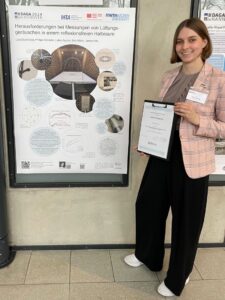
Cognitive neuroscience of auditory and cross-modal perception 2024
Last week, our colleagues Carolin Breuer and Natálie Brožová presented their work at the 5th workshop on Cognitive neuroscience of auditory and cross-modal perception in Kosice, Slovakia. The workshop was focused on neural processes of auditory, visual, and cross-modal perception with a special focus on spatial audio virtualization and gamification for hearing assessment and enhancement. Featuring 16 invited talks as well as contributed posters and presentations, the workshop allowed for a very familiar atmosphere that encouraged exchanges among attendees. These participants came from diverse fields such as acoustics, neuroscience, biology, and psychology, to name just a few.
Natálie Brožová presented her recent study on “Investigating the Neural Basis of Audiovisual Cross-modal Correspondences and Their Influence on Perceptual Decision-Making” which is part of the interdisciplinary Research Training Group “MultiSenses – MultiScales”.
Carolin Breuer presented a poster investigating visual priming on auditory selective attention in Virtual Reality which is an extension of a previous study presented at DAGA 2023 and was conducted as part of the ECoClass-VR project related to the priority program AUDICTIVE.
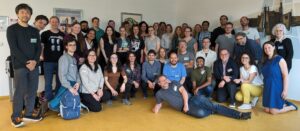
Group Picture of KogNeuro Workshop 2024
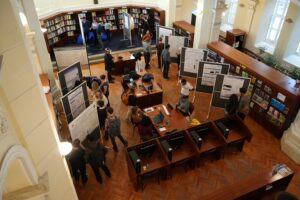
Poster Session during KogNeuro Wkroshop 2024
IHTA goes DAGA 2024
Again, IHTA is joining DAGA in Hannover with interesting contributions from March, 19th, to March, 21th, 2024. We are delighted to invite to our presentations and posters. In total, IHTA members will be represented with 19 contributions (15 presentations and 4 posters):
| Dienstag, 19.03.2024 | |||
| Thomas Deutsch, Luigi Falanga, Iring Koch, Janina Fels | Sound Localization Performance with and without Simulated Hearing Loss: Comparison of Different Spatial Audio Reproduction Methods | 13:40 | Raum 7/9 |
| Simon Kersten, Franck Sgard, Michael Vorländer | Impact of the Ear Canal Motion on the Occlusion Effect for Bone-Conducted Stimulation | 14:20 | Raum 7/9 |
| Christian Dreier, Michael Vorländer | Air traffic auralization: Modeling and synthesis of drones | 15:00 | Blauer Saal |
| Philipp Schäfer, Pascal Palenda, Lukas Aspöck, Michael Vorländer | Plug-and-play tutorials for the auralization of complex scenarios using an open-source simulation framework (Poster) | 15:20 | Poster-Forum |
| Hark Braren, Janina Fels | Wie gut können Kinder Schallquellen lokalisieren? (Poster) | 15:20 | Glasgang, Posterbereich D |
| Lukas J. Vollmer, Frederike Rust, Janina Fels | Intuitive Pitch-to-Digit Associations Do Not Support Verbal Short-Term Memory | 16:00 | Roter Saal |
| Melchior Käppel, Marco Berzborn, Michael Vorländer | Untersuchungen zu Ambisonics-Decodern für irreguläre Lautsprecherarrays im Nahfeld | 16:00 | Blauer Saal |
| Natálie Brožová, Lukas Vollmer, Christoph Kayser, Björn Kampa, Janina Fels | Audiovisual Cross-modal Correspondences and Their Influence on Perceptual Decision Making | 16:20 | Roter Saal |
| Anne Heimes und Michael Vorländer | A new scattering metric for auralization in urban environments | 17:20 | Blauer Saal |
| Julia Seitz, Karin Loh, Janina Fels | Assessing Listening Effort in Primary School Children: A Dual-Task Approach | 17:40 | Raum 7/9 |
| Niklas Mika, Pascal Palenda, Jonas Heck, Michael Vorländer | Incorporating complex surface impedance into auralization filters based on Image Sources | 17:40 | Blauer Saal |
| Jonas Heck, Josep Llorca-Bofí, Christian Dreier, Michael Vorländer | Does ambient sound enhance outdoor auralization? | 18:00 | Blauer Saal |
| Mittwoch, 20.03.2024 | |||
| Chalotorn Möhlmann, Pascal Palenda, Michael Vorländer, Janina Fels | Comparing Simulated and Measured Urban Traffic Noise | 09:00 | Blauer Saal |
| Pascal Palenda, Philipp Schäfer, Michael Vorländer | Open-source exchange format for sound paths in interactive simulation | 17:00 | Runder Saal |
| Donnerstag, 21.03.2024 | |||
| Chinthusa Mohanathasan, Jonathan Ehret, Andrea Bönsch, Cosima A. Ermert, Janina Fels, Torsten W. Kuhlen, Sabine J. Schlittmeier | The Role of Talker Visibility on Memory and Listening Effort during Conversations | 08:40 | FMS B |
| Carolin Breuer, Robert Schmitt, Larissa Leist, Stephan Fremerey, Alexander Raake, Maria Klatte, Janina Fels | Exploring the Impact of Realistic Classroom Noise on Auditory Selective Attention | 10:20 | FMS B |
| Lara Stürenburg, Philipp Ostmann, Lukas Aspöck, Dirk Müller und Janina Fels | Herausforderungen bei Messungen von Lüftungsgeräuschen in einem reflexionsfreien Halbraum (Poster) | 11:00 | Glasgang, Posterbereich D |
| Lukas Aspöck, Melchior Käppel, Carolin Breuer, Jonathan Ehret, Andrea Bönsch, Isabel S. Schiller, Sabine J. Schlittmeier, Torsten W. Kuhlen, Janina Fels | Real-Time Auralization for a VR-based Investigation of Background Sounds in a Classroom Scenario (Poster) | 11:00 | Glasgang, Posterbereich A |
| Alexander Raake, Stephan Fremerey, Carolin Breuer, Larissa Leist, Maria Klatte, Janina Fels | Towards using Audiovisual Scene Analysis to Evaluate Cognitive Performance in Classroom Scenarios | 15:20 | FMS B |
An overview of all contributions and updated information can be found in the DAGA 2024 App.
We are looking forward to seeing you at DAGA 2024!
New exhibition DEAR ARCHITECTS: SOUND MATTERS
How often do you think about sound? How do you want people to feel when you are designing a space? Good acoustics design is inherent to architecture. Every decision you make about shape, form, geometry, volume and materials defines the acoustics. So how do you design proactively for the right outcomes, the first time?
With the comprehensive exhibition DEAR ARCHITECTS: SOUND MATTERS we want to link the field of acoustics more with that of architects. We show how acoustics are integrated into the design process and how auralization and simulation tools make it possible to experience acoustics at an early stage.
The exhibition is organized by the PAAD group in collaboration with the Design Computation chair at the RWTH.
Place: Reiff Foyer of the Faculty of Architecture, RWTH Aachen University, Schinkelstraße 1, 52062 Aachen
Dates: 7-13 December
Finissage: 13th December at 19h
Contact person: Josep Llorca-Bofí, josep.llorca@akustik.rwth-aachen.de
Aachen Acoustics Colloquium 2023
Next week the 14th Aachen Acoustics Colloquium will take place at Parkhotel Quellenhof in Aachen. On Tuesday, November, 28th and Wednesday, November, 29th, the scientific program includes 22 interesting presentations about current research within the area of automotive acoustics, accompanied by a technical exhibition from various companies and research institutes. A detailed overview of the program can be found in this PDF.
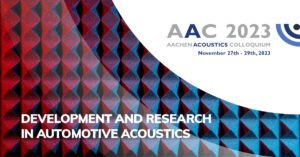
Our Institute contributes to two presentation to this conference:
- Mark Müller-Giebeler: “FE-Based Inverse Approach to Determine Complex Acoustic Material Parameters in Alpha Cabins”
- Chalotorn Möhlmann: “Holistic Approach for Aurally Accurate Road Traffic Noise Reduction by Adaption of Traffic Routes and Infrastructure Planning” (together with Carolin Schliephake, part of the BalSaM project)
Registration for the on-site participation this event is no longer available, but the registration for online participation is still possible on the AAC website.
International Conference on Auditorium Acoustics 2023 in Athens
From September 28th to 30th, the Institute of Acoustics has held the 11th International Conference on Auditorium Acoustics at the Stavros Niarchos Foundation Cultural Center (SNFCC) in Athens, Greece. Jonas Heck and Josep Llorca-Bofí as well as our alumnus Ingo Witew presented their research in the field of concert halls and room acoustics:
- Jonas Heck, Josep Llorca-Bofí and Michael Vorländer: Concert Halls in Virtual Reality – From Audio-visual Perception to a Common Vocabulary
- Ingo Witew and Michael Vorländer: Measurements in room acoustics – How good are we at it?
On the first conference day, Jonas Heck and Josep Llorca-Bofí organized a round table to discuss the importance of descriptive vocabulary which can be used to depict the perception in concert halls. The poster „Concert Halls in Virtual Reality – From Audio-visual Perception to a Common Vocabulary“ was accompanied by a demonstration of a recent experiment in virtual reality. It was very well received by the delegates who selected it for the first poster prize.
- Small auditorium, Stavros Niarchos Foundation Cultural Center (SNFCC), Foto: Josep Llorca-Bofí
- Poster award recipients, Foto: Sergio de las Heras
- Stavros Niarchos Foundation Cultural Center (SNFCC), Foto: Jonas Heck
- Big auditorium, Stavros Niarchos Foundation Cultural Center (SNFCC), Foto: Jonas Heck
- Demonstration of experiments in virtual reality, Foto: Sergio de las Heras
- Demonstration of experiments in virtual reality, Background: Poster, Foto: Josep Llorca-Bofí
Research trip to Santiago de Chile
From October 10th to October 13th 2023, Lukas Aspöck participated in the workshop “Digital transformation in the development of rehabilitation sciences: the current challenge to use state-of-the-art technology” on behalf of the Institute for Hearing Technology and Acoustics.
The workshop was held in Santiago de Chile and Valparaíso and was mainly hosted and organized by the Universidad San Sebastián. The program included many interesting presentations by national and international researchers related to machine learning, virtual reality and the development of sensors and tools which can be applied within different fields of rehabilitation and related research. As part of the workshop, the researchers also visited various facilities, ranging from laboratories and workshops for speech therapy and audiology to a healthcare unit for physical rehabilitation and the research and technology transfer center AC3E of the Federico Santa María Technical University.
- Visit at the AC3E research center, Valparaiso Photo: Sandra Rojas
- The organisation team of the event Photo: Lukas Aspöck
- Lukas during his presentation Photo: Rhoddy Viveros
- Speech lab in AC3E center in Valparaiso Photo: Lukas Aspöck
Lukas contributed to the event by giving a 60-minute presentation with the topic “Virtual reality environments for research in acoustics and audiology”. The slides of this presentation are available here.
Many thanks to our former colleague Rhoddy Viveros for the organization and the invitation to this event. Thanks also to the rest of the organization team, which was led by Carla Contreras and also included Sandra Rojas, Matías Zañartu and Cristhian Mendoza. The event was funded by the Chilean National Research and Development Agency (International Linkage FOVI220126).
Jahrestagung der Gesellschaft für Musikforschung 2023
Im Rahmen der Jahrestagung der Gesellschaft für Musikforschung 2023 in Saarbrücken fand am 5. Oktober 2023 ein Marktplatz aktueller Forschung statt, in der Methoden und Werkzeuge für die digitale Musikforschung präsentiert werden konnten. Im Zuge der Zusammenarbeit mit Prof. Stefan Morent von der Universität im Projekt „Sacred Sound – Sacred Space“ demonstrierten unsere Mitarbeitenden Carolin Breuer und Pascal Palenda die Möglichkeiten, Räume akustische zu simulieren und auralisieren, in virtuelle Räume hinzusingen oder zu musizieren, sowie Räume in der Virtuellen Realität mit Hilfe eines Head-Mounted-Displays interaktiv akustisch-visuell erlebbar zu machen.
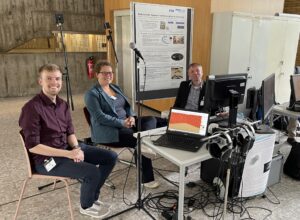
Stand bei der Jahrestagung für Musikforschung. Foto: Martin Albrecht-Hohmaier
New publication on HRTFs in Journal of the Audio Engineering Society
We are happy to announce that the article “A magnitude-based parametric model predicting the audibility of HRTF variation” by Shaima’a Doma, Cosima Ermert, and Janina Fels has been recently published in the Journal of the Audio Engineering Society (JAES) as part of the Special Issue on “Spatial Audio”. The study examines just noticeable differences in HRTFs with a focus on monaural cue changes. The probability of a listener detecting spectral changes is modelled as a function of three monaural error metrics, with linear model coefficients derived using Principal Component Analysis.
The open-access article can be viewed and downloaded in the AES E-Library.
Sacred Sound: The acoustic reconstruction of no longer existing spaces
The project Sacred Sound – Sacred Space, led by musicologist Prof. Stefan Morent of the University of Tübingen, deals with the acoustics of sacred spaces as they existed and were used many centuries ago. In cooperation with IHTA, this project uses simulations to reconstruct, for example, the acoustics of the abbey church of Cluny III in order to auralize the liturgical chants of the medieval monks. Cluny III existed between 1130 and 1790 and was the largest church in the world until the construction of St. Peter’s Basilica in Rome.
Based on the room acoustic simulations, medieval choir chants were performed and recorded in IHTA’s laboratories by the ensemble Ordo Virtutum. During the recordings, the singers were presented with the reflections of the virtually reconstructed church space in real time. In further steps of the project these recordings will be analyzed musicologically in order to investigate the influence of the architecture on the musical performance.
Parts of the project were recently documented by the SWR in a radio (116 min.) and a TV report (20 min; both in German language).
- Remnants of Cluny III (Foto: CC0, pxhere.com)
- 3d model of cluny III. Black and dark grey parts show the still existing remnants of the church (Picture: Lukas Aspöck, CC-BY 4.0)
- Ray Tracing simulation in the acoustic 3d model of Cluny III (Picture: Lukas Aspöck, CC-BY 4.0).
- Simulated (and measured) reverberation times for the remnants and the full church (Picture: Lukas Aspöck, CC-BY 4.0).
- Ensemble Ordo Virtutum during the recording session at the hemi anechoic chamber at the Institute (Picture: Lukas Aspöck, CC-BY 4.0).
Thanks for everyone at IHTA who supported this project. Thanks also to the Visual Computing Institute for helping out with the aixCAVE system and to the company Sennheiser for providing microphones for the recording sessions!
International Congress on Acoustics ICA 2022
The Institute for Hearing Technology and Acoustics looks back on a very enjoyable and successful 24th International Congress on Acoustics ICA 2022 in Gyeongju, South Korea. IHTA was present with a total of 10 delegates and actively contributed to the program with two theme organizers, five special session organizers, 10 oral presentations, and one plenary lecture. The conference was an excellent event to meet the international acoustic community in real life again.
- Entrance of the congress venue (Foto: Janina Fels)
- IHTA group picture with Alumnus Bruno Masiero (Foto: Janina Fels)
- Plenary talk by Janina Fels (Foto: Jamilla Balint)
- Janina Fels at her plenary talk (Foto: Cheol-Ho Jeong)
- ICA-ASA Young Scientist Conference Attendance Grant for Cosima Ermert (Foto: ICA)
- Poster and interactive IHTApark Demo (Foto: Josep Llorca-Bofi)
- Presentation by Josep Llorca-Bofi (Foto: Josep Llorca-Bofi)
- Presentation by Jonas Heck (Foto: Josep Llorca-Bofi)
- Presentation by Christian Dreier (Foto: Josep Llorca-Bofi)
The full proceedings of the conference are available for download on the ICA 2022 website.
IHTA at the BauSIM conference in Weimar
From the 20th to the 22nd September 2022, the BauSIM conference took place. The scientific core topic of the conference is traditionally the energetic simulation in the building sector and offers an ideal discussion forum for experts from science and industry for mutual exchange. The conference is organized by the and IBSPA Germany-Austria, member of the International Building and Performance Simulation Association (IBPSA) This year’s conference introduced a new session on acoustic simulation topics, and our institute was present.
In particular, our Junior Principal Investigator Dr. Josep Llorca-Bofí, from the PAAD group was invited as key-note speaker, talking about The city – A machine for noise? Virtual acoustics in architectural design research. Together with our PhD student M. Sc. Jonas Heck and Professor Michael Vorländer, the following research paper was presented: 3D photogrammetry for auralization – An approach for geometry simplification and material categorization.
- Key-note talk Dr. Josep Llorca-Bofí
- Bauhaus-Universtät Weimar
- BauSIM lecture hall
- IHTApark demonstrator
- Immersive audio and visuals
- Portable research laboratory using head-mounted display and equalized headphones
- Visit to the acoustic laboratory at the chair of Building Physics
- Visit to the acoustic laboratory at the chair of Building Physics
- Optic visualization of thermal air movement
- Visit to the optics laboratory at the chair of Building Physics




